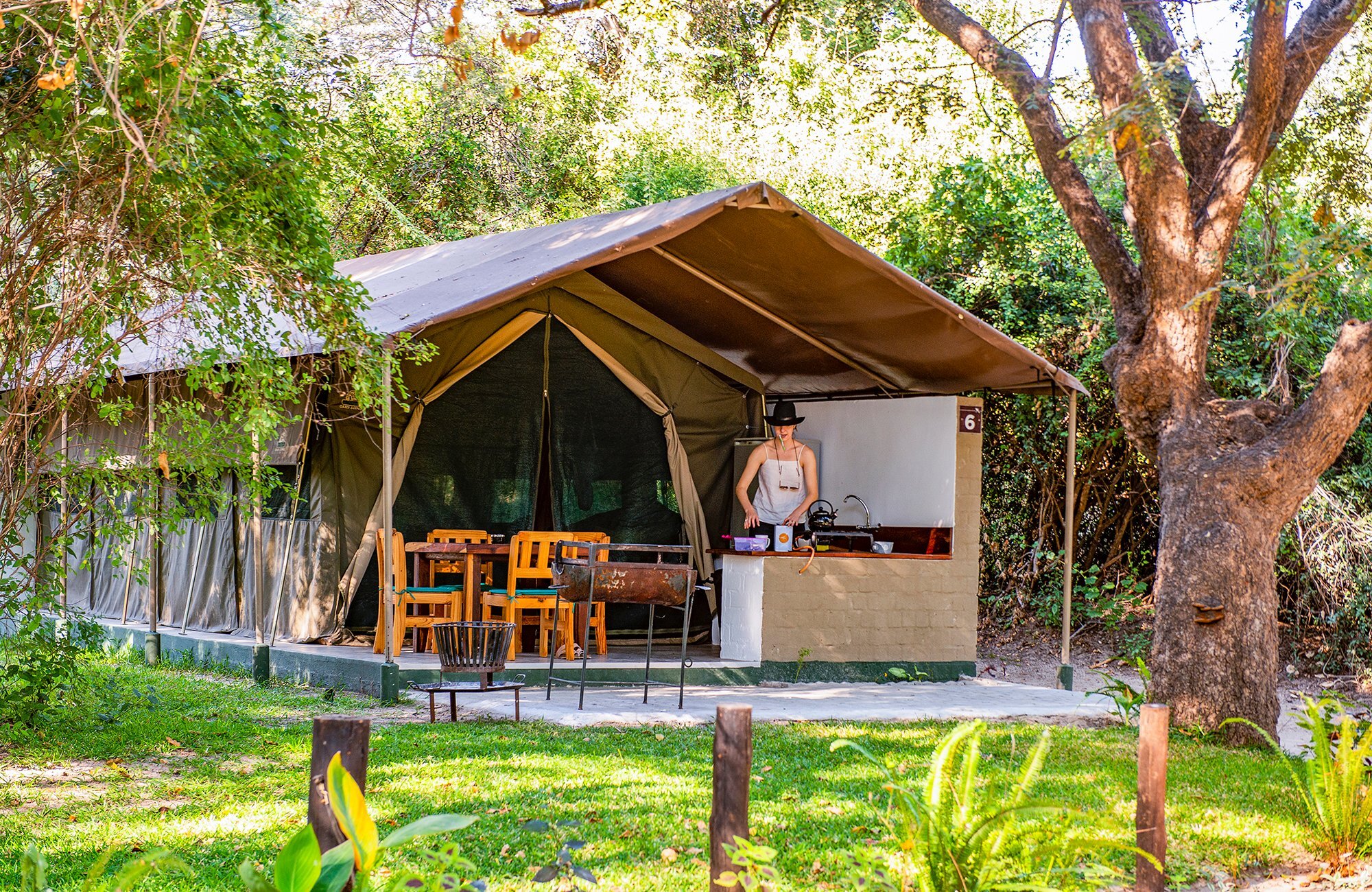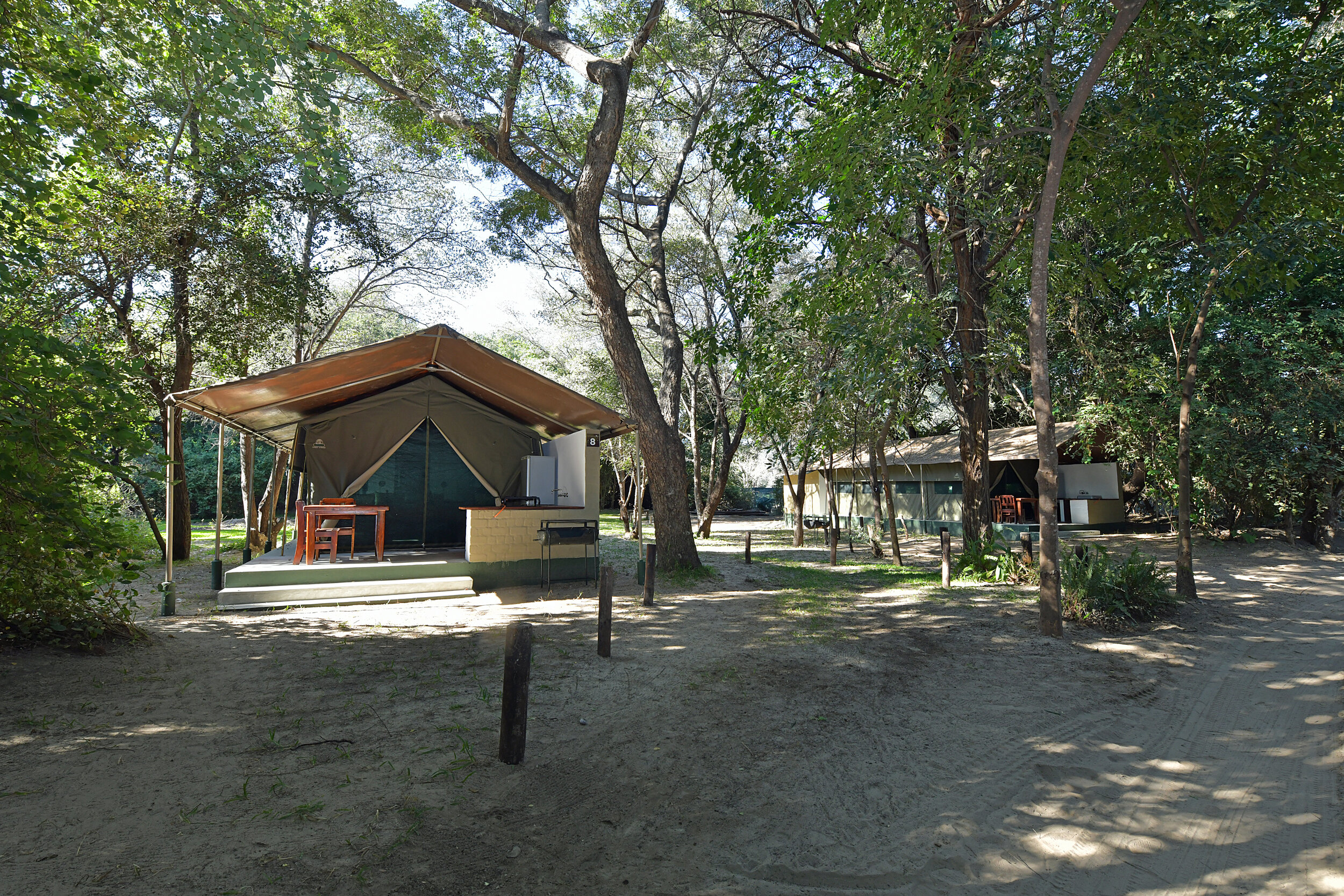Jess Reviews: Zambezi Mubala Camp
Written by Jess Tyrrell
One of the many things that I was struck by on this trip is the diversity of landscapes in the Zambezi Region. We have only explored around 14.785 km² of Namibia's 824.292 km², yet we have been spoilt by ever-changing scenery, from wetlands to floodplains to woodlands to savannas. Each has its unique draws, be it the wildlife or views, but they will all reward you handsomely!
Our last stop (sad face) was Zambezi Mubala Camp, the perfect sendoff after our life-changing adventure. If you missed the rest of our trip, click for our 1st, 2nd and 3rd destinations.
Location
Zambezi Mubala camp rests along a channel of the Zambezi River in the northeast of the Zambezi Region. We drove from the Chobe River in the east on the tarred B8 in the direction of Katima Mulilo (route 4 on the map below). After 75 km (about a 1-hour drive), a big 'Gondwana' sign on the right indicates the turn-off for Zambezi Mubala Camp. We followed the signs on the sandy roads through the villages until we reached the camp. Driving from Katima Mulilo, it is an easy 32 km (or 35-minute drive) on the tarred B8. The big sign will be on your left!
The Lodge
Driving into Zambezi Mubala, you could be mistaken for thinking you had arrived at a tropical forest escape. Shrouded in thick trees and bushes, the lodge sits inconspicuously in nature, with a first-class position right on the Sikunga Channel of the Zambezi Region that serves as a breeding area for many species of fish. The log-cabin-esque reception doubles as a curio shop, stocked with souvenirs and all the river safari equipment you would ever need. Outside, the large open deck serves as the dining area, bar and chill spot, all with views of the calm river. Directly on from the deck is the jetty where you'll be launched onto the Zambezi. In the evenings, soft, colourful lights create a relaxed ambience, under which you can snuggle up next to the fire.
Activities
What would a river camp be without on-site boat cruises? Here, we went on a sunset boat cruise down the Zambezi, with African open-billed storks soaring overhead. We enjoyed a tasty drink and quintessential safari snacks: biltong, chips and nuts, while there was a kaleidoscopic array of birds on show. We also found a bloat (also a crash or pod) of hippos peering suspiciously above the water surface. Retreating home, we had the cool breeze blowing our hair and the nostalgic smell of potato bush and wild sage satisfying our snouts. A fire had been lit back at camp, signalling the time to reflect on one hell of an African adventure.
My animal checklist:
Ground squirrels
A river monitor (2m long and it walked past my room!)
African Fish Eagle
Crocodile
Hippos
African Openbill
Yellow-billed Stork
Pied Kingfisher
White-fronted Bee-eater
Malachite Kingfisher
Rooms
The 8 en-suite safari tents are a short walk from the main lodge, and all are positioned under a canopy of green around a shaded pool and lounge area. Each room has 4 single beds, and a fully-equipped monkey-proof kitchen on a large covered veranda. Rooms are cool, wooden and decked in African accents. The enormous bathroom promises privacy and comfort and has a safe and hanging space.
Wi-Fi
Akin to its downriver sister camp, Chobe River Camp, Zambezi Mubala Camp has good wifi, BUT it is capped daily per user, so upload wisely!
Food
Zambezi Mubala Camp is self-catering. However, guests who decide not to cook for themselves can order from the lengthy à la carte menu at the lodge, which includes pizzas, burgers, and salads. With the bar right there, you won't go thirsty either.
Sustainability
Zambezi Mubala Camp is run on Gondwana's sound and inspiring sustainability ethos. Situated in the Sikunga Conservancy, the camp works closely with the community by training and employing conservancy members, and hiring river patrol rangers to watch for illegal fishing. Zambezi Mubala Camp — and Zambezi Mubala Lodge downstream — have a sophisticated waste management system that ensures the minimisation and appropriate disposal of non-recyclable materials. Waste from the camp and lodge is separated, and through their partnership with Rent-A-Drum, the bulk is recycled, and the rest is used to produce refuse-derived fuel. These bins are scattered around Zambezi Mubala Camp. To reduce the use of water bottles (untreated tap water in the Zambezi region is not safe to drink), Zambezi Mubala Lodge has a water dispenser from which you can refill your own water bottle/glass. Wastewater is also treated on-site and reused in irrigation!
Additionally, Gondwana regularly trains staff on environmental protection and spearheads clean-up campaigns in local communities. At Zambezi Mubala Lodge, an aquaponics tank supplies the lodge with herbs and lettuce, while other ingredients come from Gondwana's farming operations at their Self-Sufficiency Centre (SSC). Any organic scraps are fed to the pigs in local communities. To reduce the need for air-conditioning, rooms are built with naturally chilling materials. Zambezi Mubala Lodge also supports welfare efforts, including Feed A Child and environmental conservation causes which incentivise locals to utilise local resources sustainably.
My highlights
The green setting - the rooms are all tucked into a cool forest that is alive with small creatures
The atmosphere - it’s mega relaxed with almost a summer camp quality
The staff - their unending kindness and willingness to assist
Is it for you?
If you're after a no-frills, environmentally conscious waters-edge escape, then Zambezi Mubala Camp will tick all your boxes. In terms of animals, there aren't many of the heavy-hitters or even more minor plains game to see. So if you want to see lots of land animals, this camp shouldn't be your first port of call. If the allure of forests and tranquil rivers beckon, then hit Viatu up to book your life-changing trip!
In 3 words: relaxed, fun-for-friends, forest





















